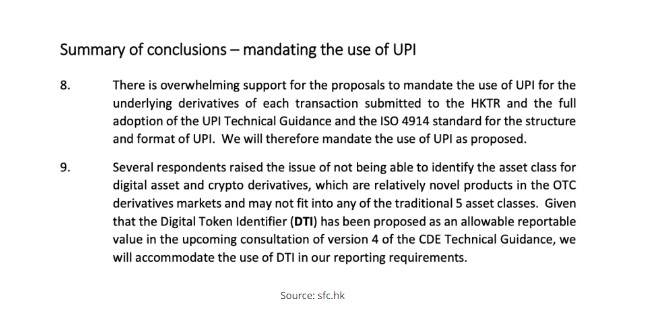Hong Kong’s financial regulators are implementing global reporting standards for over-the-counter (OTC) crypto derivatives that are comparable to the European Union’s framework.
The Hong Kong Monetary Authority (HKMA) and the Securities and Futures Commission (SFC) disclosed their intention to revise the region’s OTC derivatives reporting regime on September 26, 2024.
Digital Token Identifiers (DTIs) and other critical global identifiers will be included in the new reporting requirements, consistent with the European Securities and Markets Authority (ESMA) standards.
By September 29, 2025, the updates should be in place.
The Consultation and Response Process: What is the Future of Cryptocurrency in Hong Kong?
The HKMA and the SFC conducted a consultation in March 2024, resulting in the decision to modify Hong Kong’s reporting standards for OTC crypto derivatives.
Financial institutions, industry bodies, and stakeholders provided feedback on the consultation paper, emphasizing the necessity of incorporating international standards to guarantee compliance and seamless cross-border transactions.
The classification of crypto OTC derivatives, which cannot be readily classified under the existing five traditional asset classes — interest rates, foreign exchange, credit, commodities, and equities— was a significant issue raised by Hong Kong stakeholders.
ESMA incorporated Digital Token Identifiers (DTIs) into European reporting standards in October 2023, prompting stakeholders to advocate for their adoption.
HKMA and SFC responded by reaffirming their intention to implement DTIs for crypto-asset underliers in the OTC derivatives market.
The agencies acknowledged that the Unique Product Identifier (UPI), already required in other jurisdictions, will also be a critical component of Hong Kong’s revamped reporting regime.
In their joint statement, the HKMA and SFC emphasized the significance of adhering to global standards, observing that the ESMA’s ratification of the DTI established a framework that could guide Hong Kong’s regulatory updates.
By doing so, Hong Kong intends to guarantee transparency and uniformity in classifying and identifying digital assets transacted in its markets.

Hong Kong To Conform To International Standards
The HKMA and SFC have agreed to require the reporting of unique transaction identifiers (UTIs), unique product identifiers (UPIs), and critical data elements (CDEs). This is to make it easier for OTC derivatives markets worldwide to use the same standards and data elements.
The authorities’ decision to implement these changes indicates the increasing international pressure to enhance transparency and compliance in the crypto derivatives sector, particularly as more countries attempt to regulate digital assets within their borders.
This revised regulatory framework is anticipated to facilitate improved data aggregation and reporting practices for OTC crypto derivatives, consistent with Hong Kong’s dedication to the G20’s initiative to reform the global OTC derivatives market.
The new reporting regime will also improve the capacity of regulators to more effectively monitor financial markets, detect misconduct, and mitigate systemic risks.
Hong Kong’s financial regulators also underscored the importance of DTIs and UPIs in identifying specific transactions and products.
In addition, the standardization of these identifiers will enable authorities to collect precise data on OTC derivatives transactions and guarantee that local and international markets comply with global standards.
This timeline provides financial institutions with sufficient time to adapt to the new requirements and integrate the requisite technological infrastructure to satisfy the updated reporting obligations.
This regulatory revision concerns Hong Kong’s ongoing efforts to establish central bank digital currencies (CBDCs).
In September 2024, the HKMA initiated the second phase of its digital Hong Kong dollar (e-HKD) pilot, Project e-HKD+, through the recent Visa fiat-backed token system. Settlement for tokenized assets, programmability, and remote payments are the primary objectives of this project.


